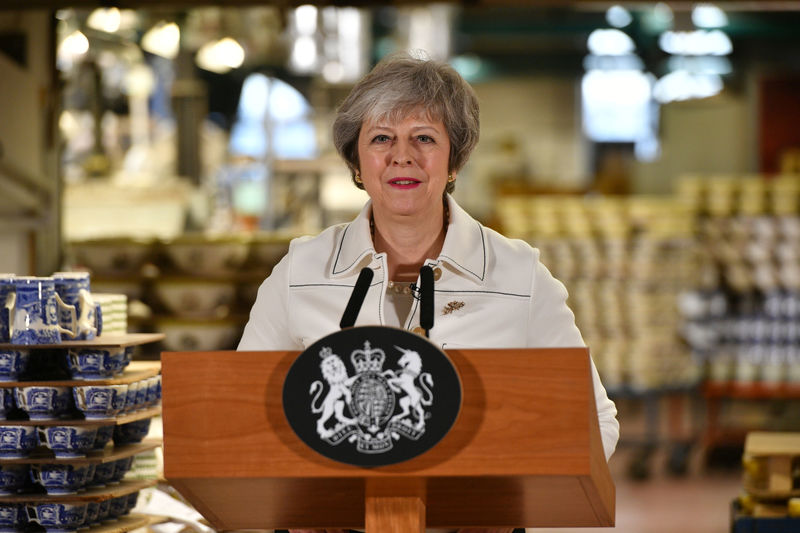 © Reuters. Theresa May visit to Stoke-on-Trent
© Reuters. Theresa May visit to Stoke-on-TrentBy Kylie MacLellan
LONDON (Reuters) – Prime Minister Theresa May warned on Monday that Britain’s planned exit from the EU could be derailed, a last-ditch effort to win over Brexit-supporting lawmakers who have repeatedly said they will vote down her divorce deal.
The fate of the United Kingdom’s March 29 exit from the EU is deeply uncertain as parliament is likely to reject May’s deal on Tuesday evening, opening up outcomes ranging from a disorderly divorce to reversing Brexit altogether.
Amid the deepest crisis in British politics for at least half a century, May and EU leaders exchanged letters giving assurances on her withdrawal agreement, though there was little sign of a change of heart among rebel lawmakers.
May used a speech at a china factory in the leave-supporting city of Stoke-on-Trent in central England to say that lawmakers blocking Brexit altogether was now a more likely outcome than Britain leaving without a deal.
“There are some in Westminster who would wish to delay or even stop Brexit and who will use every device available to them to do so,” May said.
“While no-deal remains a serious risk, having observed the events at Westminster over the last seven days, it’s now my judgment that the more likely outcome is a paralysis in parliament that risks there being no Brexit.”
As the world’s biggest trading bloc tried to brace for an unpredictable ride, Spain said the EU could agree to extend the deadline for Brexit, but not beyond elections for the European Parliament due in May.
May warned lawmakers on Sunday that failing to deliver Brexit would be “catastrophic” for democracy, and her ministers said that thwarting the outcome of the 2016 referendum could lead to rise in far-right populism.
LETTER FROM EU
As part of the effort to get the deal approved by the British parliament, the EU and May set out some assurances in a choreographed exchange of letters on Monday.
The EU told May that it stood by commitments to find ways to avoid triggering the controversial “Irish backstop” in their Brexit deal and that this pledge had legal weight.
In a joint reply to questions from May, European Commission President Jean-Claude Juncker and European Council President Donald Tusk said the EU stood by its commitment to try and reach a post-Brexit trade deal by the end of next year in order to avoid using the unpopular backstop.
While stressing that nothing in their letter could be seen as changing or being inconsistent with the draft treaty agreed with May last month, they said a commitment to speedy trade deal made by EU leaders had “legal value” which committed the Union “in the most solemn manner”.
However, even if the target date were not met, they wrote, Britain would have the option to extend a status-quo transition period to avoid triggering the backstop, which is meant to avoid a hard customs border for Northern Ireland.
“If the backstop were nevertheless to be triggered, it would only apply temporarily, unless and until it is superseded by a subsequent agreement that ensures that a hard border is avoided,” they said.
May said the assurances might not go far enough for some lawmakers and the small Northern Irish party that props up her government said it was insufficient.
“The letter isn’t legally binding,” Democratic Unionist Party deputy leader Nigel Dodds told BBC radio.
May will make a statement to parliament at about 1530 GMT.
But with her deal facing opposition from all sides in the lower house of parliament, the House of Commons, the letters are unlikely to change the fundamental outcome of the vote.
“PARLIAMENT PLOT”
With no-deal Brexit the default option if May’s deal is defeated, some lawmakers are planning to pull control of Brexit from the government.
Though May is weakened, the executive has significant powers, especially during times of crisis, so it was unclear how parliament would be able to take control of Brexit.
If May’s deal is defeated and the government is unable to have any amended version passed in the next three weeks, one suggestion is for senior lawmakers who chair parliamentary committees to come up with an alternative Brexit plan.
“We’re in the very, very final stages of the end-game here,” said Nick Boles, one of the Conservative lawmakers behind the plan, who said he would vote for May’s deal.
“What we need to do is find the solution, and if the government can’t find the solution — and we want the government to find the solution, and we’ll be voting for her solution — but if it can’t then parliament needs to,” he told BBC radio.
Source: Investing.com


























